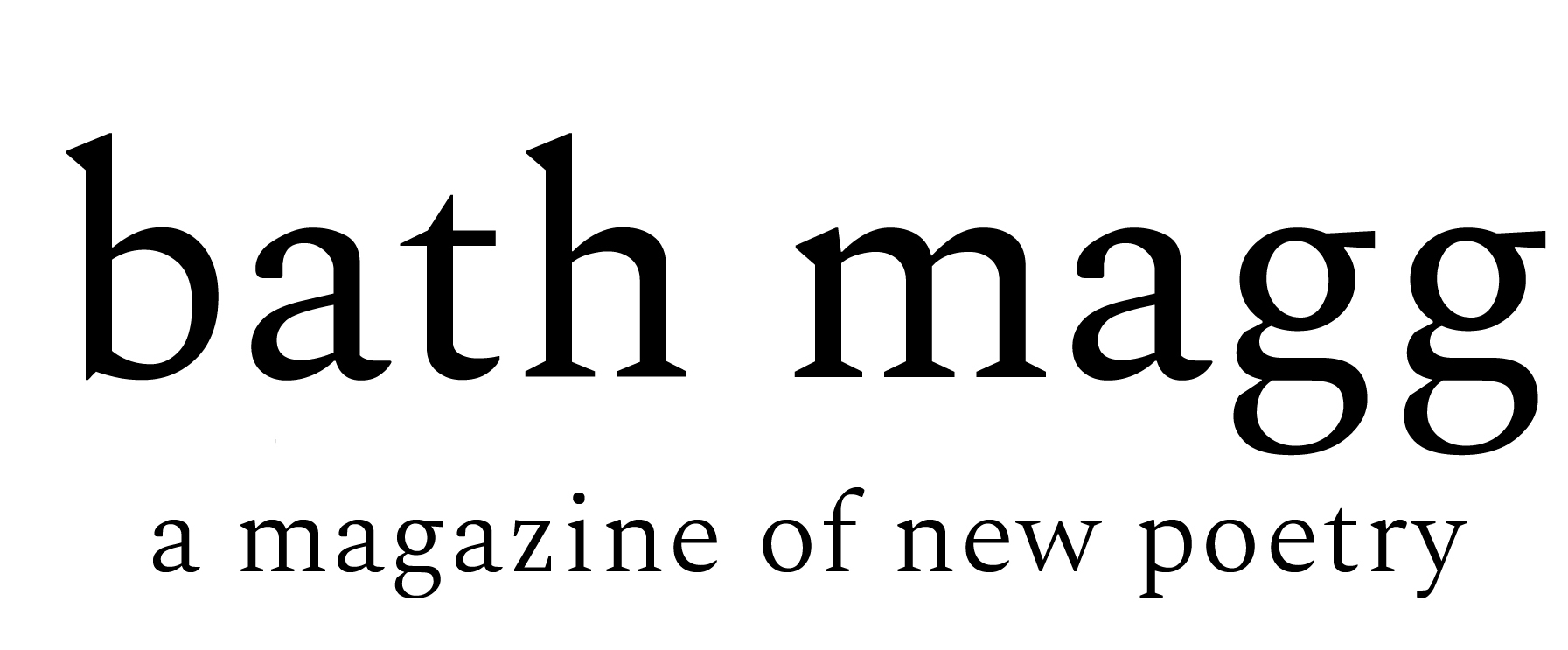Editorial #1
I am writing this from a café in a new city. A mile or so from here my new rental is internetless and filled with boxes. Just this week I quit my steady job with its steady colleagues and steady income to move 100 miles east in the hope of finding, at the very least, a new home, and, with luck, a new life. I tell you this not merely because bath magg is a new magazine; nor because bath magg has become, over these past two hectic months, a wonderful, surprising, hope-instilling new part of my life; I tell you this because the poems in bath magg 1 still feel, having read and reread them countless times, brilliantly, vitally new.
We received more than 150 submissions for Issue 1, from more than 25 different countries; poems from A Level and undergraduate students; poems from professors; poems from retired farmers and scientists; poems from nurses and psychotherapists and secondary school teachers. I know I can speak for my co-editor Mariah Whelan when I say overwhelmed (in the best way possible) is an understatement.
We started bath magg with the idea of championing emerging voices in poetry. The pair of us being poets yet to publish a first collection, we felt (and feel) inherently tied to and responsible for poets on the come-up, poets just beginning to assert themselves. This is our tribe, as it were. And this is why bath magg will always be a place for newer voices to be set in relief with the most established names around.
Issue 1 features some of the world’s best-loved poets. Vona Groarke, whose many books are never far from my bedside table, is our first feature poet. Her interview, amongst many things, offers such perfect advice to any emerging poet: ‘Take your time, edit carefully, don’t grab at anything, be it publication or poems. And keep only the corner of one eye on ‘the poetry business’; all else for the poems.’
It’s also a pleasure to publish Carl Phillips, whose work has inspired me for years, and whose poem ‘Rough Surf in Moonlight’ contains the most arresting of upward glances: ‘angels depicted as hammers of bronze / thrown skyward – though no hand visible’.
Another poet whose work I adore is Luke Kennard. His amazing whales are a feat of imagination and tonal texture: ‘The grey whale is a conscious breather… At rest it will hang vertically in the / water like an ancient satellite, like anhedonia’.
Rebecca Goss’ Her Birth is a book that is particularly close to my heart, so it’s a real honour to feature her wonderful time capsule of a moment: ‘Let me stall // the acceleration of your days / by bringing you here.’
The list goes on.
But Issue 1 also features 13 poets yet to publish a first collection.
Nina Reljić is an undergraduate student and her poem ‘inside reverse fold’ is an example of how to end a poem breathlessly and imagistically: ‘wrapped around each other, you are amazed / by the ways a body will bend, / ten-fold, over and over / like how you make cranes / from paper.’
Ella Frears closes her poem ‘Midpoint’ with a sucker punch of a dramatic aside: ‘Madam, filling up your dusty Peugeot, / it’s OK to stare. Come, / let me wipe my puffy eyes on your trouser leg.’
Marvin Thompson’s ‘Cwmcarn’ is a heart-breakingly important poem: ‘born in London, / was I English // like school’s / niggers out // graffiti? / Did my parents // make me / Jamaican? // Or was I, / by ancestry, / African?’
Again, the list goes on.
So, what’s the point in all of this? Why conflate the two: Emerging and Established?
I come back to the very special kind of newness that poetry can offer. Yes, the poems in bath magg 1 are new, but not in the plain sense of the word. Collectively they offer a cross-section of the many-layered heart of poetry in 2019. The poems, isolated from their authors, rub shoulders together. And the heat they produce is new; their scope and future and fire is new.
So, I hope that you, dear reader, will return to these poems long into the future. And I hope, no, I know that they will continue to reveal their dazzling newness, the way this high street café reveals itself to be, not unlike any café I’ve sat in before, but new (fresh, urgent, alive might be more appropriate adjectives) to me, at least for now, because the oldest song in the world is new to the person who hears it for the first time.
Joe Carrick-Varty, on behalf of the editorial team.
